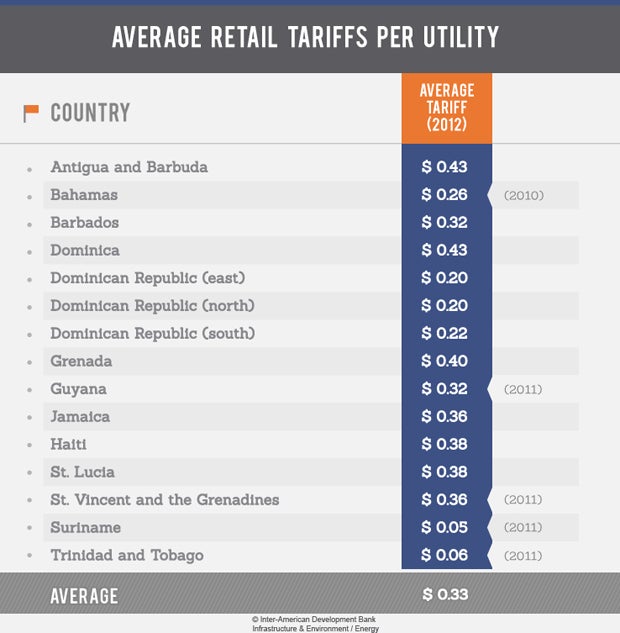by Christopher Barton, Lumas Kendrick, and Malte Humpert
The high and volatile price of electricity is the most important issue in the energy sector. Electricity prices in the Caribbean are among the highest in the world, and they fluctuate greatly with the global price of oil. The primary cause of the high cost of electricity is that most Caribbean countries use diesel and heavy fuel oil for electricity generation. These fuels are expensive and their prices fluctuate greatly based on the global price of oil. The table below shows average tariffs for 2010, 2011, and 2012 for utilities in numerous countries. The table shows that Trinidad and Tobago and Suriname have the lowest average tariffs, followed by the Dominican Republic. The table shows that all other Caribbean countries have significantly higher average tariffs, at levels above US$0.30 per kilowatt/hour.
There is an inseparable linkage between the fiscal crisis confronting the Caribbean Region and the reality of paying some of the world’s highest per capita energy costs. The countries in the region are encumbered with the necessity of importing increasingly expensive oil products for transportation and electricity generation. Covering the ever-increasing cost of energy places enormous pressure on countries whose national budgets are already heavily indebted. Thus, a new Caribbean energy future is needed. Caribbean leaders in the public and private sectors must focus on taking full advantage of the region’s wealth of renewable energy resources, maximizing energy efficiency, and adapting recent developments in natural gas technology and supply to transform the Caribbean’s energy market.
On December 5, the IDB is hosting a regional, ministerial-level energy conference in Washington, D.C. entitled, “The Caribbean’s Energy Future: A Pathway to Regional Fiscal Stability.” The key objectives of this one-day event are to: (1) provide a forum to examine the issues associated with the region’s high energy costs and associated impacts; (2) explore options for addressing this problem; and, (3) set forth a roadmap that will assist the region in developing a cleaner, more cost effective, and sustainable energy matrix.
As an honest broker in the region, the IDB seeks to assist the Caribbean in making the necessary changes in policy coordination, financial structuring, and infrastructure transformation that will usher in this new energy future for the region. This conference is but one small yet crucial step in this transformational process.


if there was 1 MWh of electricity produced for every meeting held or 100+ page documents produced on energy, the Caribbean would be energy independent by now. The challenges, constraints and risks associated with a total reliance on oil for electricity generation are well documented and understood. Similarly, the opportunities and benefits that can be derived from moving to renewable energy technologies and greater energy efficiency are quite clear to most. What is lacking is an investment climate which recognizes these realities and promotes private sector risk taking and innovation. Presently much of what happens takes place at 10,000 feet and above with very little – or no – impact on the ground.
I have been working in solar and wind for seven years in the U.S. We are looking at moving out efforts to the Caribbean, but I cannot tell from the figures you provided what the exact KwH costs are
Where can I find a list? This would include distribution as well
Thank you
Alex Hillman
Hi Alex ,
Can you contact me today or tomorrow?
I am working to install more solar energy in Suriname
within a couple of months !
You have my email address; my cell # is +597 8903400
Kindest regards
Eric Kafiluddin
01-09-2015
I only read about past tariff rates. What are the current rates like for the Bahamas? Has the Bahamas been more accepting of PV in current months?